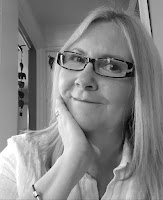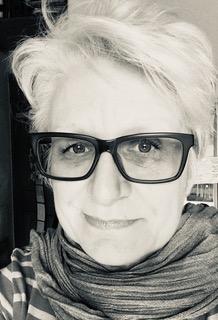Today’s guest is one of my favourite writers, Amanda Huggins. She joins us to chat about her forthcoming novella ‘All our squandered beauty’ from Victorina Press. My review follows at the end of the interview …
Amanda Huggins is the award-winning author of the forthcoming novella All Our Squandered Beauty, as well as four collections of short fiction and poetry. Her travel writing, fiction and poetry have been widely published in anthologies, textbooks and travel guides, as well as newspapers and magazines including The Guardian, The Telegraph, Wanderlust, Reader's Digest, Writers' Forum, Popshot and Mslexia. Her short stories have also been broadcast on BBC radio.
She has won a number of awards for her travel writing, most notably the BGTW New Travel Writer of the Year in 2014, and has been shortlisted and placed in numerous short story and poetry competitions including Bridport and Fish. In 2018 she was a runner-up in the Costa Short Story Award and her prize-winning story 'Red' features in her latest collection, Scratched Enamel Heart. In 2019 her novella, All Our Squandered Beauty, was shortlisted in the Best Opening Chapter Competition at York Festival of Writing and this year she won the Colm Toibin International Short Story Award, was included in the BIFFY50 list of Best British and Irish Flash Fiction 2019-20, and her poetry chapbook, The Collective Nouns for Birds won the Saboteur Award for Best Poetry Pamphlet.
Amanda grew up on the North Yorkshire coast, moved to London in the 1990s, and now lives in West Yorkshire.
ALL OUR SQUANDERED BEAUTY:
Kara's father died at sea – or did he? She has spent her teenage years struggling with grief and searching for answers. When she accepts her art tutor's offer to attend a summer school on a Greek island, she discovers once again that everything is not what it seems, and on her return she faces several uncomfortable truths. Could Jake, a local trawlerman, be the key to uncovering the past, and will Kara embrace the possibilities her future offers or turn back to the sea?
QUOTES
". . . a beautifully told coming-of-age story which will capture your heart and deserves to be a classic." Sarah Linley, author of The Trip.
"This is a wonderful read filled with tenderness, charm and hope." Gail Aldwin, author of The String Games.
"Amanda writes with empathy, an eye for vivid detail, a sense of adventure, and great charm." Alison Moore: Booker-shortlisted author of The Lighthouse.
Q. How did All Our Squandered Beauty come into existence? Can you share the inspiration and motivation behind writing this novella?
Hi Tracy, thank you for inviting me to talk about my novella – it’s lovely to be back chatting on The Literary Pig again!
All Our Squandered Beauty started life as a short story – in fact it was the title story of my first collection, Separated From the Sea. Several readers said they wanted to know what happened next, so that was my motivation!
The inspiration came mainly from my love of the sea, particularly the North Yorkshire coast where I was brought up. Much of my work has the sea at its heart: the way it gives and takes, its strength and cruelty, its transformative power, its untameable beauty. There is a strong sense of living on the edge when the place you call home is bordered by something as immense and unforgiving as the sea. My novella is set in the 1970s, when this fragility of existence, a certain otherness, was often compounded by the fact that coastal village livelihoods were precarious and wrapped up in danger – fishing, mining, the local steelworks.
All Our Squandered Beauty is also set partly in Greece, and I loved writing about the contrast between the two locations and the way these differences affect the characters and their decisions. I have always been interested in how we are formed and moulded by our environment, in the ways in which the places where we are brought up and where we live influence our personalities and perspectives, inform our actions.
I also took inspiration from a story I read on the internet which explored the near-impossible dilemma when a loved one is presumed dead without their body ever being recovered, and how incredibly hard it is to hope and grieve at the same time. This was the case for thousands of people after the Japanese tsunami in 2011, something I first touched on in my story, ‘The Last of Michiko’ and which I have now examined in depth in the novella.
Q. I love all the myths and folklore that you've woven into this story. Where do these come from and why do they fascinate you?
My parents used to read me a bedtime story every night when I was a small child and I was always drawn to otherworldly tales of elves, goblins and mythical lands, of unusual rituals and local folklore. I grew up being aware of many myths and fables surrounding the fishing communities on the north east coast and I’ve always been interested in the way traditions and rites are religiously observed, passed on from generation to generation, anchoring and binding communities, offering a spiritual comfort. There was no deliberate plan to weave quite so many of these elements into my novella, but my imagination took over!
In the book, Kara’s late father, Ged Bradshaw, was a trawlerman from a small fishing community, and therefore folklore, ritual ceremony and superstition would have been a part of his daily life. I wanted to explore the way Kara is shaped by these traditions herself, how they become an intrinsic part of her and of the way she navigates her way through the world.
Q. You write across several forms, including short stories, flash fiction, poetry and now a novella. How did you approach writing a longer piece of prose, did you do anything different in your writing habits?
When I started writing All Our Squandered Beauty, instead of trying to finish a complete draft I kept editing the first chapter as though it was a short story – a complete waste of time, as the original opening chapters didn’t make the final cut anyway! In the original draft I tried to cover too much ground, so there was much more about Kara’s childhood and early teens than there is in the finished book. I realised I should concentrate on the events of a pivotal summer in Kara’s life, and that the rest was back story.
When I started re-drafting I found it necessary to bulldoze through the whole manuscript for a continuous period each time – I couldn’t seem to work on it bit by bit in the evenings. Luckily, M and I often go away for week-long cottage breaks, and I also go on a yearly writing retreat with my friend, so I was able to get to the finish line by way of these longer writing sessions.
Q. And do you have any writing superstitions that you can share with us? (For example, I create a specific playlist to listen to when I'm writing a long piece of fiction and dare not listen to anything else.)
I always enjoy hearing about other people’s rituals and good luck charms – I love the idea of a playlist, though it wouldn’t work for me as I need silence when I write! I’m quite superstitious in everyday life – I’m always wishing magpies’ wives well and I avoid walking under ladders – but I don’t have any writing superstitions as such. There is one thing I always try to do though – I stop writing when I still know what will happen next. That way I’m never stuck when I start to write again the next day.
Q. Do you have any other writing projects in progress or planned?
I’m currently writing my third novella, An Unfamiliar Landscape, set in London and Japan – while still tinkering with the final draft of my second novella, Crossing the Lines. I’m actually hoping this new one might be a full length novel, but we’ll see! Other than that I’ve been busy writing a short story course for Retreat West, which will be up and running soon, and I’m also concentrating on another short story collection.
Q. Most importantly, where can we buy a copy of All Our Squandered Beauty?
All Our Squandered Beauty will be out mid-January 2021 and can be pre-ordered from Victorina Press.
Thanks again for having me as a guest on The Literary Pig, and for asking such interesting questions!
My review:‘All our squandered beauty’ is the wonderful new novella by Amanda Huggins (Victorina Press) and my only wish is that I could have kept on reading as I didn’t want it to end. Huggins writes with heart, intuition and a genuine understanding of what makes her characters tick. Her prose is fluid and compelling, woven through with passages of such lyrical beauty that this often felt like a love letter to the North Yorkshire coast (where the author grew up). Kara is seventeen in 1978, a talented artist who is struggling to cope with the aftermath of her beloved dad’s death. His fishing boat was found deserted at sea, his body never recovered, so Kara is stuck in the nightmare stage of her grief, believing he’s not dead but simply lost, or worse he’s abandoned her. These thoughts are damaging her relationships with her mum, best friend and boyfriends.
The Yorkshire coastal setting, and the Greek island, are enigmatically brought to life by Huggins’ skilful imagery. I particularly enjoyed how local folklore and legends were integral to Kara’s inner world and the significance of beach pebbles and glass became almost magical. Immersed in Kara’s 1978 of cheesecloth and flares I felt completely at home, and didn’t want to leave. She finds passion and romance in Greece, then maybe real love and understanding when she returns to Yorkshire. It’s through the love and kindness of others that Kara finally begins to heal and realise how to balance loss and love, and still achieve her ambitions. For me, the ending was mesmerising and magical, making this a truly fulfilling read.





